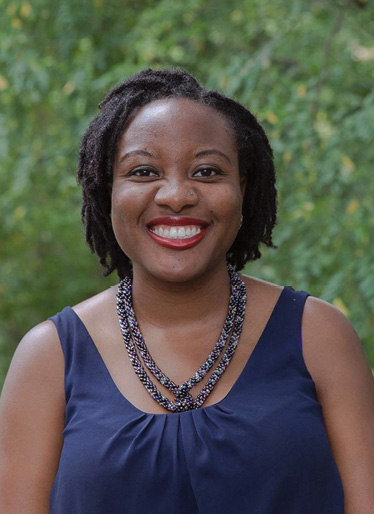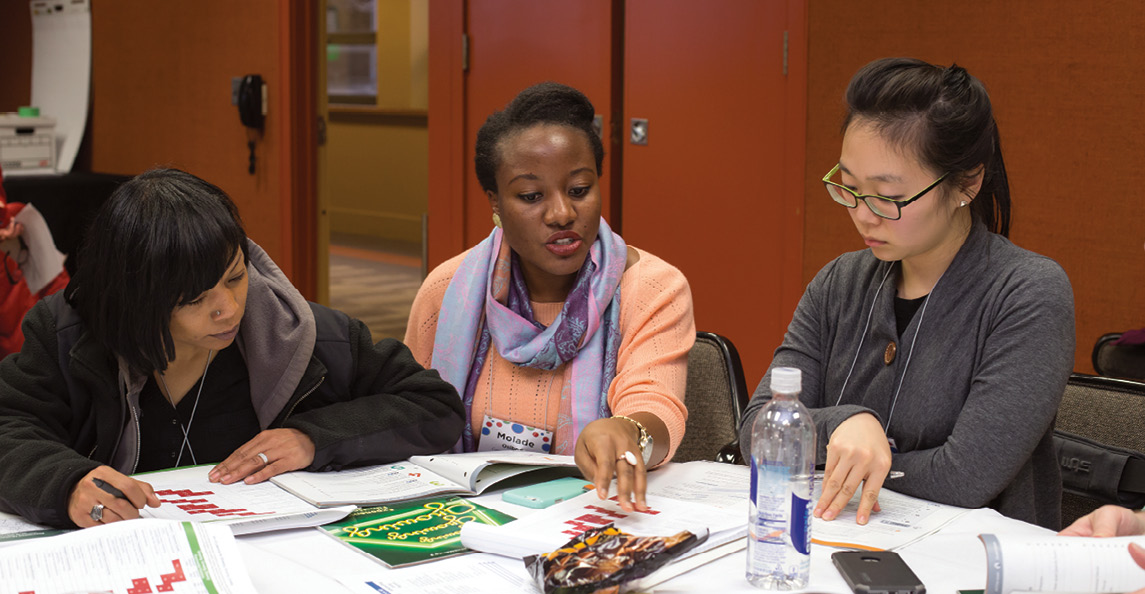Meaningful Math: How Experimental-Based Curriculum Impacts Social Change
- Oyemolade Osibodu
- Ph.D. student
- Program in Mathematics Education
- College of Natural Science and College of Education

Oyemolade Osibodu's commitment to community-engaged scholarship has grown stronger during her time at MSU. Photo courtesy of Oyemolade Osibodu.
Many people like math because they think it is straightforward. Numbers either add up or they don't. Oyemolade Osibodu, a doctoral student in the Program in Mathematics Education (PRIME), has a different perspective. Her goal is to teach math in qualitative or contextual terms, giving students the skills to investigate or understand issues that are affected by quantification, a method often used as a hallmark of administrative power and control.
PRIME, which is jointly administered by the Colleges of Natural Science and Education, is a Ph.D. program geared toward scholars, teachers, and students seeking to understand and improve the teaching and learning of mathematics. Osibodu entered the program in 2015. Currently in the dissertation planning stage, she has been mulling over her growing portfolio to determine what comes next.
Leaving her native Nigeria when she was 16, Osibodu flew to Tennessee to attend the University of Memphis. She received a degree in electrical engineering and mathematical sciences, and worked as an electrical engineer in Little Rock, Arkansas. She then pursued a master's in applied math at the University of Central Arkansas and a Ph.D. at the University of Georgia.
"I had started a Ph.D. at the University of Georgia when I got the opportunity to teach at the African Leadership Academy in Johannesburg, South Africa. I'd been in the U.S. for eight years, and gone home only twice. I definitely felt like I was losing touch with what I was trying to do," Osibodu said.
"I think that being at the African Leadership Academy reshaped my identity in ways that are just so powerful—it was the best five years of my life. It was the best decision I've ever made, because before that I didn't have this sense of purpose, especially as it related to the African continent," said Osibodu. "I met people from Madagascar, Cape Verde, and places all across Africa. I want to use my dissertation research to bring in voices of Africans, whether I'm working with African communities in the U.S. or on the continent."
Influenced by Martin Luther King, Jr., and Desmond Tutu, Osibodu believes, as King wrote, that "injustice anywhere is a threat to justice everywhere."[1] Integrating math education with social justice issues in a teaching curriculum can introduce students to critical thinking tools. "It's really important for me to craft research with youth, where I'm not just extracting information but where their voices are centered—and even in this space they are learning," she said.
One example of that work comes from a summer course Osibodu taught two years ago that dealt with qualitative literacy.
"Many of them had student loans. Bringing in the economics and finance, we taught them what it means when you get a loan, how to think about 20 or 30 years of interest on the loan, and what it means for their future. Then, we discussed predatory lending just to put things in context. That's when you can think about math in relation to social justice or social issues," said Osibodu.

Oyemolade Osibodu (center) works with attendees at a conference hosted by the Connected Mathematics Project (CMP).
"Then we talked about all of that in relation to putting those numbers into world wealth—thinking about how less than one percent of the population in the world holds the wealth—what does that mean?"
Osibodu found the course feedback and reviews encouraging. "We had a lot of comments that said they felt like they actually learned something that was meaningful for their lives, and they now had a better understanding of what these things, like student loans, mean to them."
An Advocate for International Social Justice
Osibodu has been deeply immersed in the international culture at MSU. She has served as the president of the African Graduate Students Association, and received MSU College of Education recognition through the Tanzania Partnership Program Curriculum Development Fellowship and the Fellowship to Enhance Global Understanding in Indonesia. Her advisor is Beth Herbel-Eisenmann, professor in the Department of Teacher Education, who has expertise in the professional development of curriculum and classroom discourse practices, with a particular interest in issues of equity that concern authority, positioning, and voice in mathematics classrooms and professional development.
Osibodu is intentional in attending conferences with a large international audience like the Comparative and International Education Society in 2017. Most recently, she presented the paper "Possibilities for Symbolic Power in Mathematics: Necessitating a Critical Awareness of Dehumanizing Quantification" at the 2018 gathering of the American Educational Research Association in New York.
Osibodu is looking forward to finalizing her dissertation and excited to see where her doctoral work will take her in the future. She believes that project-based, or experiential-based, curriculum propels social change. "The way math curriculum is enacted has an impact on student learning, and can foster social change in these contexts," said Osibodu.
In addition, Osibodu's commitment to community-engaged scholarship has grown stronger during her time at MSU. She said, "We are doing our work with people, because if community people are not partnered with you, it will not work. I'm reading a book right now that says, ‘knowledge was there before you came and found it.' I think that's really important to remember when we are working with young people. We are sharing knowledge, not making our knowledge the only knowledge. I want to give them the authentic experiences and opportunities to learn rigorous mathematics, and encourage awareness of the social justice issues and impacts surrounding the math."
Source
- King, M. L., Jr. (1994). Letter From the Birmingham Jail. Harper San Francisco. Return to article
- Written by Carla Hills, University Outreach and Engagement
- Photo by Amie Lucas for CMP